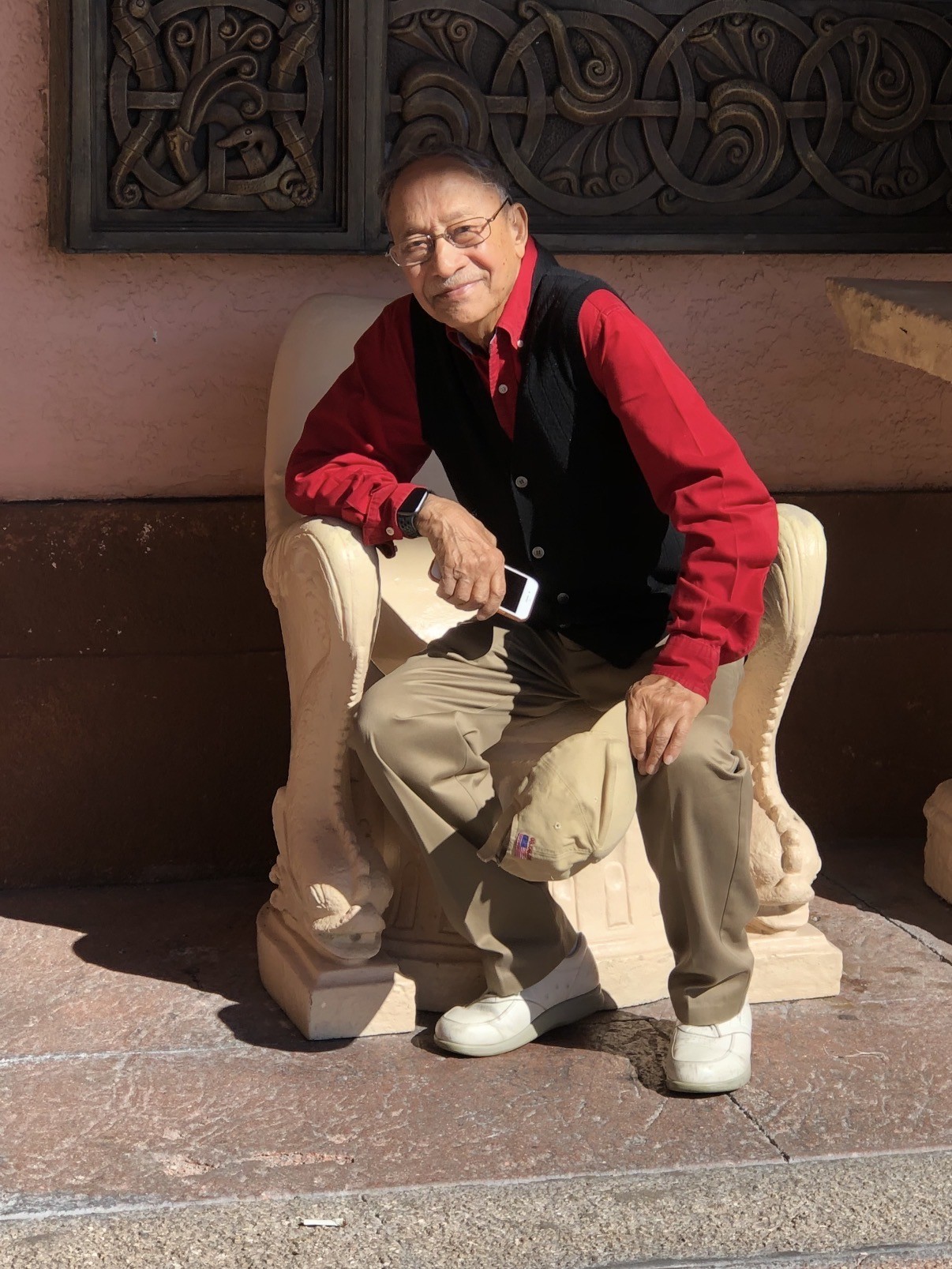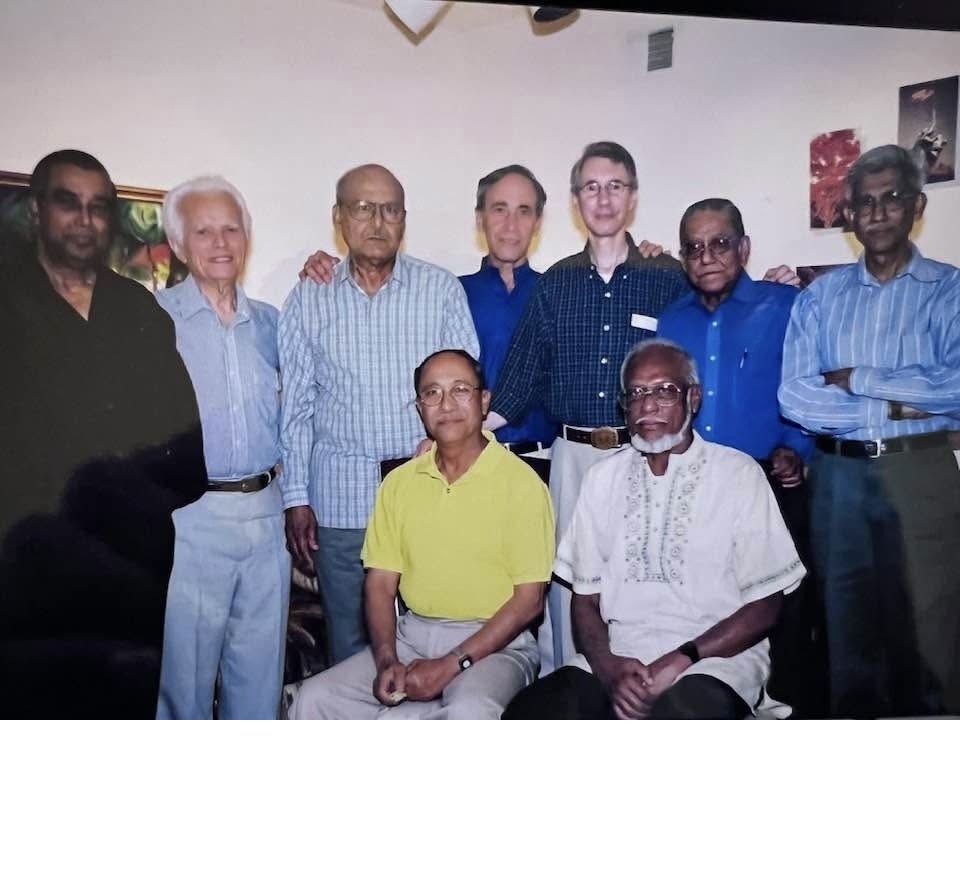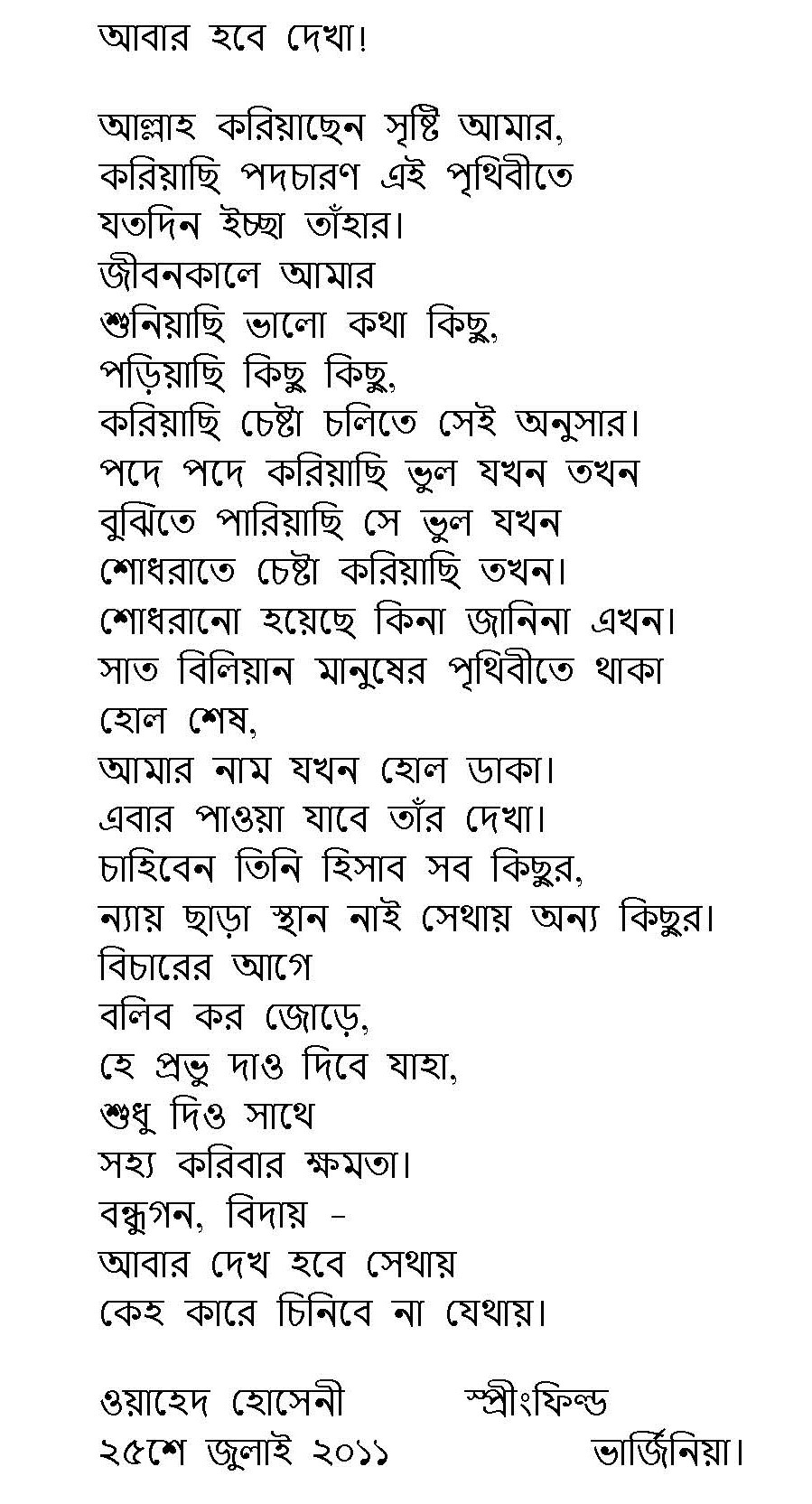Remembering Wahed Hossaini
 By Michael Schneider
By Michael SchneiderWahed Hossaini was a bright light in USIS Dacca when I arrived in early 1965 to serve as Assistant Information Officer. I had been trained in Bangla in Calcutta, so it was logical for the ongoing assignment to be in then-East Pakistan.
Bolstered by an ample supply of PL-480 rupees derived from the sale of US grain in Pakistan, the post was a dominant media presence in the East Wing (current-day Bangladesh). In addition to the very active radio production program, I supervised the exhibits production activity for the post’s extensive window display areas as well as displays for programs the post conducted with local colleges and civic groups. The job also included oversight of extensive motion picture distribution and showings throughout the East Wing. The post maintained a small fleet of 4-6 jeep vans equipped with 16mm and kerosene film strip projectors, backup batteries when local power sources waned, and even a couple hundred kerosene film strip projectors used to support mainly public health and agricultural programs.
 Wahed was part of a team that produced original Bangla language programming for VOA broadcasts. This team included Kaffee Khan, Hay Khan, and the team supervisor Rafiqul Huq. Their production included translations of English language writings into Bangla for VOA as well as features on current development in Bangladesh and U.S. assistance. The team was also instrumental in helping East Pakistan Radio introduce TV in the east wing. In the beginning, the new TV station relied heavily on USIS Dacca Bangla versions of USIA documentaries.
Wahed was part of a team that produced original Bangla language programming for VOA broadcasts. This team included Kaffee Khan, Hay Khan, and the team supervisor Rafiqul Huq. Their production included translations of English language writings into Bangla for VOA as well as features on current development in Bangladesh and U.S. assistance. The team was also instrumental in helping East Pakistan Radio introduce TV in the east wing. In the beginning, the new TV station relied heavily on USIS Dacca Bangla versions of USIA documentaries.We remained in touch after Wahed settled in the DC area, became a U.S. citizen, and flourished both at work and in his many civic activities. Below is an obituary prepared by his family. Wahed was a remarkably talented person who contributed much to America and to the Bangladeshi community. He is an exemplar of how America benefits from immigration.
(Photo on right shows: Peter Brescia (CAO), Kaffee Khan (VOA), Sigmond Cohen (ACAO), Michael Schneider (AIO), Sharful Alam (VOA), Zaiur Rahman (VOA), and Quraishi (USIS); seated: Wahed Hossaini & Salahuddin Ahmed)
WAHED AL HOSSAINI
A life of service; a life of action
In the fall of 2010, following the funeral of a community member in the Washington, D.C. area, Ashfaq Hai approached a slender, elderly gentleman—Wahed Hossaini. With heartfelt sincerity, he said, “Uncle, I am proud of you. Whenever there is a crisis in the community, you are there.” Mr. Hossaini smiled warmly, embraced him, and replied, “Thank God. Somebody has to do it.”
That simple exchange captured the essence of Wahed Hossaini’s life—a life defined by service, leadership, and a commitment to others.
A Life of Service
Mr. Hossaini settled in the Washington, D.C., area in 1974. Since then, he was at the forefront of community efforts whenever there was a need. A naturalized U.S. citizen from Bangladesh, he served as President of the Bangladesh Association of America, Washington, D.C., focused on preserving the culture of Bangladesh for expatriates while embracing American culture. He served as the Founding General Secretary of the Federation of Bangladeshi Associations of North America (FOBANA), for which he drafted the original constitution with goals similar to the Bangladesh Association of America.
His warm heart and volunteer efforts extended far beyond the Bangladeshi community. He served as Vice-Chair of the Fairfax County Democratic Committee, remained active in the committee until his passing, worked as a Legislative Specialist for AARP Virginia, and volunteered with Rebuild America and INOVA Fairfax Hospital. For several years, he also organized an annual food drive benefiting ECHO, a local food bank in Springfield, Virginia.
Syed Wahed Ali Al Hossaini was born in 1937 in Midnapur, West Bengal, India. In 1947, following the partition of British India into India and Pakistan, he moved with his parents, Syed Shahed Ali Al-Hossaini and Aziman Nessa Begum, from Bilaspur (Madhya Pradesh) to Lalmonirhat, and later to Dhaka. He received his education at Nawabpur Government High School, Jagannath College, and the University of Dhaka. In 1969, he married Arzina Ali, beginning a lifelong partnership marked by shared values and dedication to community and family.
For 15 years, Mr. Hossaini worked with the U.S. Information Service in Dhaka, a position that brought him into close company with many of Bangladesh’s most celebrated writers, journalists, actors, directors, professors, and artists. Through this role, he gained rare insight into the translation of American literature into Bangla and was actively involved in producing short Bangla radio dramas for the Voice of America, adapted from American short stories.
During the Bangladesh War of Independence in 1971, Mr. Hossaini served as an interpreter for several international journalists, including Pulitzer Prize-winning New York Times reporter Sydney Schanberg, Reader’s Digest reporter David Reed, and others, playing a vital role in helping the world understand the unfolding struggle for freedom.
In 1973, Wahed, along with his wife and their 10-month-old daughter Lisa, immigrated to the United States, carrying with him the values, experiences, and dedication that would define his life’s work. Later, when Wahed became a U.S. citizen, he changed his name to Wahed Al Hossaini, adopting the naming practice of his new homeland.
Arriving in the United States just after the Watergate scandal, Mr. Hossaini realized that neither his Master’s degree in Journalism nor his wife’s Master’s degree in Bangla Language and Literature would translate into career opportunities in their new homeland. The early 1970s marked the dawn of the computer age in America, and Wahed and Arzina recognized the need to adapt. Together, they enrolled first at the Fairfax Computer Learning Center and later at the U.S. Department of Agriculture Graduate School in Washington, D.C., earning certificates in software programming, analysis, and design. Their determination was rewarded as Arzina built a distinguished career as a computer specialist with the U.S. federal government, while Wahed spent many years at TRW, contributing to critical defense, intelligence, and aviation projects. Yet, no matter how far his professional life in technology took him, Wahed never let go of his first love—writing. It remained the steady thread running through all the chapters of his life.
Both Wahed and Arzina were very active in preserving and promoting Bangla culture in their new homeland. They were instrumental—both on stage and behind the scenes—in producing and acting in the first-ever Bangla drama staged in the Washington, D.C., area. They also launched ONNESA, the first Bangla magazine published from Washington, with Wahed contributing as both writer and editor. In his early years in Washington, Wahed continued to nurture his passion for journalism, working part-time for the Voice of America Bangla Service. Around the same time, The Probashi (Living Abroad) Bangla newspaper was launched in New York City. Wahed immediately became its honorary Washington representative. After The Probashi ceased publication, Wahed contributed to new Bangla magazines in New York and Toronto. He became a regular political commentator for Thikana (the largest-circulated Bangla weekly in New York) and for Porshi, a Bangla monthly magazine published in Fremont, California. He also reported community events for several Washington-based Bangladeshi blogs, where his articles were widely read.
In his later years, Wahed undertook a deeply personal and ambitious project—translating the Qur’an into Bangla rhyme. Though he doubted whether he would complete it to his full satisfaction, he took comfort in knowing he had fulfilled three personal dreams in America.
“I wanted my daughter to be an educated professional lady,” he once said. That dream came true—she became a space systems engineer, married, and is now the mother of two children. He also longed to attend an Olympic Games, which he accomplished in Atlanta in 1996. And finally, he wished to perform Hajj, which he did in 2000.
Wahed’s legacy extended beyond his immediate family: His three brothers, Wajed, Khaled, and Shawkat, also live with their families in the Washington metropolitan area, carrying forward the bonds of family and community he valued so deeply.
Wahed wrote the following poem:
Allah created me,
I have walked upon this earth
For as long as He willed.
During my lifetime,
I have heard some good words,
Read a little here and there,
Tried to live accordingly.
I have made mistakes, again and again,
And when I realized those mistakes,
I tried to correct them.
Whether they were corrected or not, I do not know now.
In this world of seven billion people,
My time has come to an end,
When my name was called.
Now I will get to see Him.
He will ask for the account of everything,
There is no place there for anything but justice.
Before the judgment,
I will say with folded hands:
“O Lord, give whatever You will,
Only grant me
The strength to endure it.”
Friends, farewell—
We shall meet again there,
Where no one will recognize another.
Wahed Hosaini
Springfield, VA
25th July 2011
